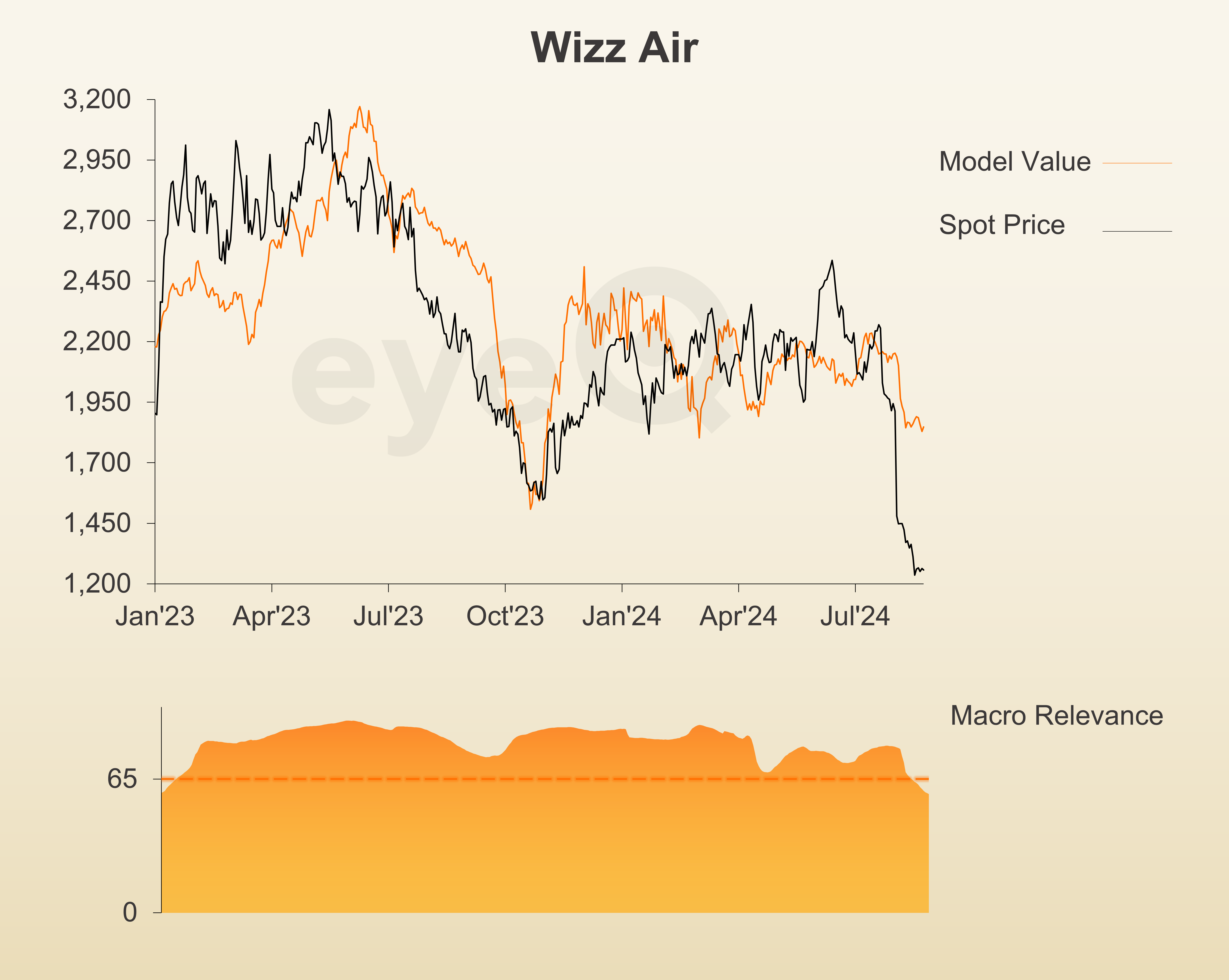eyeQ: is Wizz Air woe a buying opportunity?
Experts at eyeQ have used AI and their own smart machine to analyse macro conditions and generate actionable trading signals. This is what it tells us about this mid-cap.
22nd August 2024 11:06
by Huw Roberts from eyeQ

"Our signals are crafted through macro-valuation, trend analysis, and meticulous back-testing. This combination ensures a comprehensive evaluation of an asset's value, market conditions, and historical performance." eyeQ
- Discover: eyeQ analysis explained | eyeQ: our smart machine in action | Glossary
Wizz Air
Trading signal: long-term strategic model
Model value: 1,847.88p
Fair Value Gap: -47.01% discount to model value
Model relevance: 58%
Budget airline Wizz Air Holdings (LSE:WIZZ) is back in the news – its unlimited annual flight pass sold out in 48 hours and it is considering releasing more.
The plan is not without its controversies. Rival budget carrier Ryanair have described it as a “marketing scam” given that you can only book flights three days before departure.
But the airline needs to do something. The recent earnings report was the catalyst for a 35% sell-off in August alone! They issued a profit warning and sell-side analysts responded with a raft of downgrades. BarCap lowered their target price a huge amount, down to 1,000p.
eyeQ’s macro relevance score is 58%, meaning big-picture stuff such as growth and inflation explains just over half of price action; but we’re not above our 65% threshold for a macro regime, i.e. where macro is the dominant driver of the share price. Our valuation signal therefore comes with a health warning.
What’s interesting in the chart below is eyeQ model value. Yes, the eye is drawn to the spectacular crash in the share price. Yes, macro conditions have deteriorated. But not to anything like the same degree.
The difference is explained by the poor earnings and bottom-up company news. But that’s taken the stock significantly below macro-warranted model value. And model value is potentially trying to bottom out. Can macro cut Wizz Air a break?
The budget airline is a high-risk play and we’d want to see a definitive turn up in model value, but it is one to watch given how far the stock has fallen.

Source: eyeQ. Past performance is not a guide to future performance.
Useful terminology:
Model value
Where our smart machine calculates that any stock market index, single stock or exchange-traded fund (ETF) should be priced (the fair value) given the overall macroeconomic environment.
Model (macro) relevance
How confident we are in the model value. The higher the number the better! Above 65% means the macro environment is critical, so any valuation signals carry strong weight. Below 65%, we deem that something other than macro is driving the price.
Fair Value Gap (FVG)
The difference between our model value (fair value) and where the price currently is. A positive Fair Value Gap means the security is above the model value, which we refer to as “rich”. A negative FVG means that it's cheap. The bigger the FVG, the bigger the dislocation and therefore a better entry level for trades.
Long Term model
This model looks at share prices over the last 12 months, captures the company’s relationship with growth, inflation, currency shifts, central bank policy etc and calculates our key results - model value, model relevance, Fair Value Gap.
These third-party research articles are provided by eyeQ (Quant Insight). interactive investor does not make any representation as to the completeness, accuracy or timeliness of the information provided, nor do we accept any liability for any losses, costs, liabilities or expenses that may arise directly or indirectly from your use of, or reliance on, the information (except where we have acted negligently, fraudulently or in wilful default in relation to the production or distribution of the information).
The value of your investments may go down as well as up. You may not get back all the money that you invest.
Equity research is provided for information purposes only. Neither eyeQ (Quant Insight) nor interactive investor have considered your personal circumstances, and the information provided should not be considered a personal recommendation. If you are in any doubt as to the action you should take, please consult an authorised financial adviser.
Disclosure
We use a combination of fundamental and technical analysis in forming our view as to the valuation and prospects of an investment. Where relevant we have set out those particular matters we think are important in the above article, but further detail can be found here.
Please note that our article on this investment should not be considered to be a regular publication.
Details of all recommendations issued by ii during the previous 12-month period can be found here.
ii adheres to a strict code of conduct. Contributors may hold shares or have other interests in companies included in these portfolios, which could create a conflict of interests. Contributors intending to write about any financial instruments in which they have an interest are required to disclose such interest to ii and in the article itself. ii will at all times consider whether such interest impairs the objectivity of the recommendation.
In addition, individuals involved in the production of investment articles are subject to a personal account dealing restriction, which prevents them from placing a transaction in the specified instrument(s) for a period before and for five working days after such publication. This is to avoid personal interests conflicting with the interests of the recipients of those investment articles.